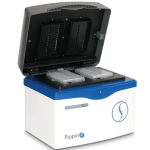Transmission of microRNA antimiRs to mouse offspring via the maternal-placental-fetal unit
March 2018
Authors:
Jonas Hönig, Ivana Mižíková, Claudio Nardiello, David Emanuel Surate Solaligue, et al.
Info:
In Germany, researchers delivered microRNA inhibitors to pregnant mice, finding that the antimiRs were then detectable in offspring, where they caused fewer off-target effects compared to direct injection of antimiRs into mouse pups. This approach could make it easier to study the effects of microRNAs during pregnancy and early postnatal development. For this project, the team used PippinHT to size-select RNA pools with a target size of 154 bp.
Citation:
RNA
http://rnajournal.cshlp.org/content/early/2018/03/14/rna.063206.117.abstract
Improving saliva shotgun metagenomics by chemical host DNA depletion
February 2018
Authors:
Clarisse Marotz, Jon Sanders, Cristal Zuniga, Livia Zaramela, Rob Knight, and Karsten Zengler
Info:
Scientists from the University of California, San Diego, developed and evaluated a new protocol for enriching microbial DNA collected from fresh and frozen human saliva samples. Compared to commercially available kits, their method is “cost-effective, rapid, and robust,” the team concludes. They used PippinHT to remove primer dimers and target 300 bp to 800 bp DNA fragments prior to sequencing.
Citation:
Microbiome. 2018; 6: 42.
https://microbiomejournal.biomedcentral.com/articles/10.1186/s40168-018-0426-3
Study protocol: rationale and design of the community-based prospective cohort study of kidney function and diabetes in rural New Mexico, the COMPASS study
February 2018
Authors:
Antonin Jaros, Hafiz Sroya, Venita Wolfe, Vikas Ghai, et al.
Info:
Scientists report design and launch of the COMPASS study, a prospective, longitudinal cohort in rural New Mexico aimed at better understanding diabetic chronic kidney disease and related biomarkers. They believe focusing on a high-risk area will help address disparities in kidney disease research. For miRNA biomarker discovery, they are using PippinHT to select purified PCR products ranging from 127 bp to 156 bp.
Citation:
BMC Nephrology
doi: 10.1186/s12882-018-0842-4
Small RNA populations revealed by blocking rRNA fragments in Drosophila melanogaster reproductive tissues
February 2018
Authors:
Emily Fowler, Irina Mohorianu, Damian Smith, Tamas Dalmay, Tracey Chapman
Info:
Scientists present a method for removing highly abundant rRNAs for improved analysis of small RNAs in RNA interference studies. Results showed increased resolution of sRNAs, even those seen at low frequency. For this work, the team cited BluePippin as a commonly used size selection tool for preparing sRNA-seq libraries.
Citation:
PLoS One
doi: 10.1371/journal.pone.0191966
The DNA Methylome of the Hyperthermoacidophilic Crenarchaeon Sulfolobus acidocaldarius
February 2018
Authors:
Mohea Couturier and Ann-Christin Lindås
Info:
Scientists from Stockholm University investigated the impact of DNA methylation in archaeal genomes by analyzing the complete DNA methylome of S. acidocaldarius using PacBio sequencing. The team used BluePippin to remove short fragments prior to sequencing.
Citation:
Front. Microbiol.
doi: 10.3389/fmicb.2018.00137





